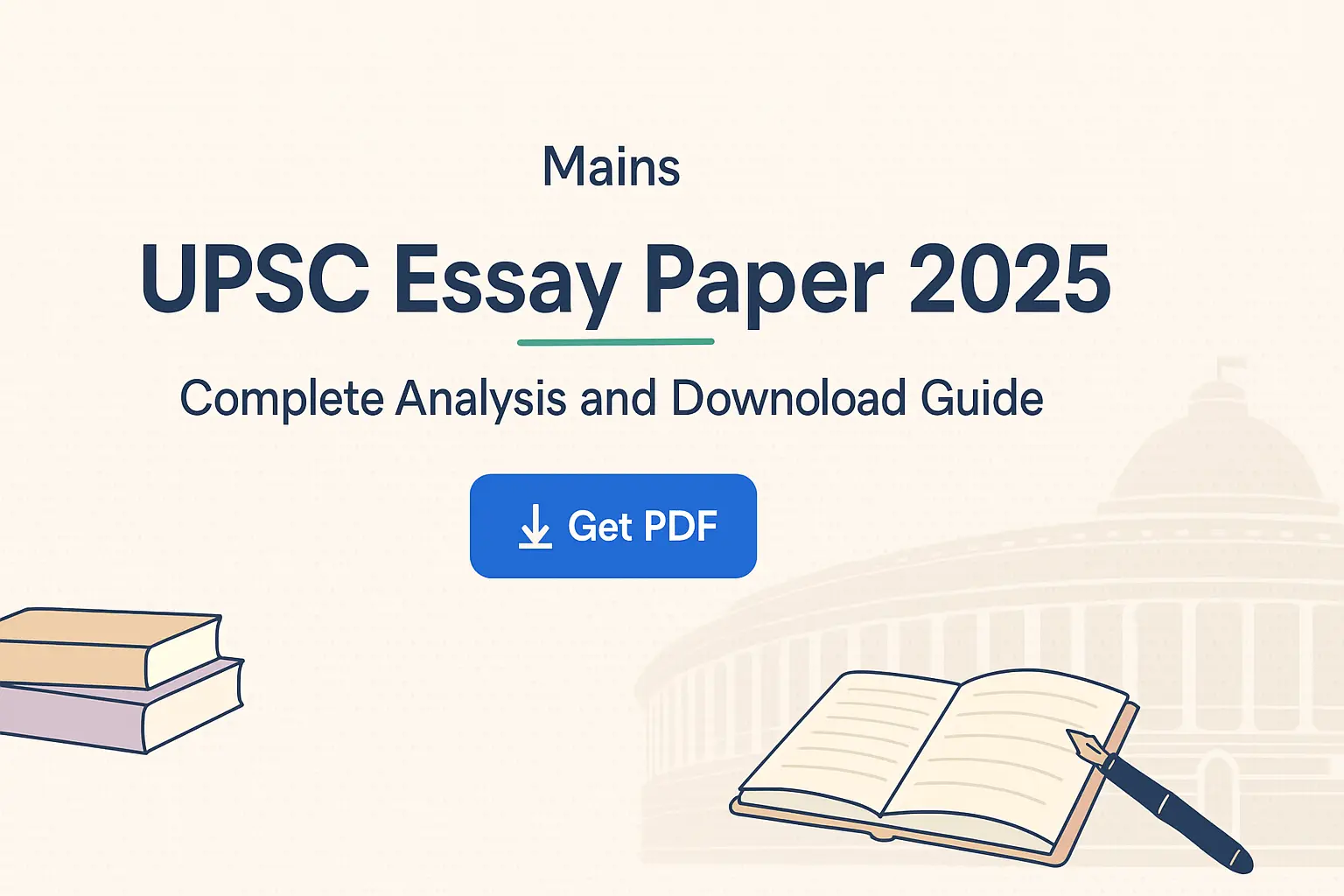
The UPSC Civil Services Mains 2025 Essay paper has been conducted, and we now have the official question paper with eight thought-provoking topics across two sections. This comprehensive analysis will help you understand the paper pattern, topic breakdown, and strategic approach for future aspirants.
Quick Facts: UPSC Mains Essay Paper 2025
- Paper Title: Essay
- Total Marks: 250 marks
- Duration: 3 hours
- Format: Two sections (A & B) with 4 topics each
- Requirement: Write one essay from each section
- Word Count: 1000-1200 words per essay (as mentioned in instructions)
- Marks Distribution: 125 marks per essay
UPSC Mains 2025 Essay Topics: Complete Question Paper
Section A (खंड – A)
- सत्य को कोई रंग नहीं लगता है। / Truth knows no color.
- बिना लड़े ही दुश्मन को परास्त करना युद्ध की सर्वोच्च कला है। / The supreme art of war is to subdue the enemy without fighting.
- विचार एक दुनिया खोजता है और एक बनाता भी है। / Thought finds a world and creates one also.
- सबसे अच्छे सबक कड़वे अनुभवों से ही सीखे जाते हैं। / Best lessons are learnt through bitter experiences.
Section B (खंड – B)
- मैले पानी को अकेला छोड़ देने से ही उसे साफ़ किया जा सकता है। / Muddy water is best cleared by leaving it alone.
- वर्ष बहुत कुछ सिखाते हैं, जो दिन कभी नहीं जानते। / The years teach much which the days never know.
- जीवन को यात्रा के रूप में देखना सर्वोत्तम है, न कि गन्तव्य के रूप में। / It is best to see life as a journey, not as a destination.
- संतोष स्वाभाविक सम्पति है, विलासिता कृत्रिम निर्धनता है। / Contentment is natural wealth, luxury is artificial poverty.
How to Download Official UPSC Mains 2025 Essay Question Paper PDF
Step-by-Step Process:
- Visit the official UPSC website: upsc.gov.in
- Navigate to “Examinations” section
- Click on “Previous Year Question Papers” or “Active Examinations”
- Look for “Civil Services (Main) Examination 2025”
- Select “Essay Paper” from the list
- Download the official PDF
Important Note: Avoid memory-based versions circulating on social media. Only the official UPSC PDF is authentic and error-free.
Detailed Topic Analysis: Section A (Philosophical-Abstract Themes)
1. Truth knows no color
Core Concept: Universal nature of truth beyond prejudice, bias, caste, creed, or ideology.
Essay Scope:
- Absolute vs relative truth in philosophy
- Truth in science (universal laws, empirical evidence)
- Truth in governance (transparency, accountability)
- Challenge of post-truth era and misinformation
Contemporary Relevance:
- Digital misinformation and fact-checking
- Social media echo chambers
- Judicial independence and constitutional values
- Scientific temper vs pseudoscience
2. The supreme art of war is to subdue the enemy without fighting
Core Concept: Strategic wisdom, diplomacy, and psychological advantage over violent conflict.
Essay Scope:
- Ancient wisdom: Kautilya’s Arthashastra and Sun Tzu’s strategies
- Gandhian non-violence and Satyagraha
- Modern diplomacy and economic warfare
- Corporate competition and market strategies
Contemporary Applications:
- India’s diplomatic approach to border disputes
- Economic sanctions as policy tools
- Cyber warfare and information battles
- Soft power projection
3. Thought finds a world and creates one also
Core Concept: Dual function of human thought – discovery and creation.
Essay Dimensions:
- Scientific discoveries revealing natural laws
- Philosophical systems shaping civilizations
- Constitutional thought creating democratic institutions
- Technological innovation transforming society
Indian Context:
- Freedom struggle and idea of Swaraj
- Constitutional assembly debates
- Digital India and technological transformation
- Indigenous knowledge systems
4. Best lessons are learnt through bitter experiences
Core Concept: Learning and growth through adversity, failure, and suffering.
Multi-level Analysis:
- Personal resilience and character building
- Societal learning from wars, pandemics, disasters
- Policy reforms following governance failures
- Global lessons from economic and environmental crises
Examples to Consider:
- COVID-19 pandemic lessons
- 1991 economic reforms post-crisis
- Climate change awareness post-disasters
- Democratic resilience through challenges
Section B Analysis (Practical-Life & Ethical Themes)
1. Muddy water is best cleared by leaving it alone
Core Philosophy: Patience, non-interference, natural self-correction.
Application Areas:
- Personal emotional regulation and mindfulness
- Minimal government intervention vs market forces
- International relations and strategic patience
- Environmental regeneration and restoration
Governance Examples:
- Judicial restraint vs activism
- Economic policy: intervention vs laissez-faire
- Social issues: legal change vs cultural evolution
2. The years teach much which the days never know
Core Insight: Long-term perspective and accumulated wisdom.
Thematic Exploration:
- Individual maturity and life experiences
- Institutional memory and organizational learning
- Historical perspective in policy-making
- Generational wisdom transfer
Policy Context:
- Long-term impact of education policies
- Environmental conservation efforts
- Social reform movements and gradual change
3. It is best to see life as a journey, not as a destination
Philosophy: Process-oriented living and continuous growth.
Dimensions:
- Bhagavad Gita’s Nishkama Karma philosophy
- Development as process vs mere GDP targets
- Personal well-being and mindfulness
- Learning and adaptation throughout life
Societal Applications:
- Sustainable development goals
- Educational philosophy and lifelong learning
- Mental health and work-life balance
4. Contentment is natural wealth, luxury is artificial poverty
Core Message: True wealth in satisfaction vs spiritual emptiness of materialism.
Analysis Framework:
- Indian philosophical traditions (Santosh, Aparigraha)
- Gandhian simplicity and self-reliance
- Consumerism critique and environmental sustainability
- Global inequality and development paradigms
Strategic Essay Structure for High Scores
Universal Template (Applicable to Any Topic)
Introduction (1 paragraph)
- Clean definition or thought-provoking paradox
- Avoid clichés and obvious statements
Conceptual Core (2-3 paragraphs)
- Problem identification and stakeholder mapping
- Historical and philosophical foundations
- Contemporary relevance
Multi-dimensional Analysis (4-5 paragraphs)
- Political, economic, social dimensions
- Technological and environmental aspects
- Legal and ethical considerations
- Use 1-2 concrete examples per dimension
Counter-perspective (1 paragraph)
- Potential challenges and limitations
- Unintended consequences
- Moral hazards
Way Forward (2 paragraphs)
- Prioritized solutions and recommendations
- Institutional mechanisms and implementation
- Measurable outcomes
Conclusion (1 paragraph)
- Return to central theme with forward-looking insight
- Avoid preachy or utopian endings
Time Management Strategy
- 15 minutes: Topic selection and detailed outline
- 60 minutes: First essay writing
- 60 minutes: Second essay writing
- 5 minutes: Final review and proofreading
Key Insights: UPSC Mains 2025 Essay Paper Pattern
Continuing Trends
- Philosophical depth: Abstract themes requiring conceptual clarity
- Bilingual presentation: Hindi and English options for inclusivity
- Ethical dimensions: Value-based topics testing moral reasoning
- Contemporary relevance: Ancient wisdom with modern applications
Section-wise Character
- Section A: More philosophical and abstract, requiring deeper conceptual understanding
- Section B: Life-philosophy oriented, easier to relate with personal and governance experiences
Success Factors
- Avoid superficial treatment: Move beyond obvious observations
- Balance philosophy with practicality: Connect abstract concepts with real-world applications
- Multi-disciplinary approach: Integrate history, politics, economics, science, and ethics
- Contemporary examples: Use recent developments and policy initiatives
- Original thinking: Avoid reproducing standard coaching material
Common Pitfalls to Avoid
- Topic drift: Writing on adjacent themes rather than exact topic
- Sermon-like tone: Preachy conclusions without analytical depth
- List-making without analysis: Enumeration without reasoning
- Over-quotation: Excessive use of quotes without context
- Lack of Indian context: Missing federal nuances and local applications
Essential Content Bank for Essay Writing
Cross-domain Examples (15-20)
- UPI and digital payment revolution
- JAM Trinity (Jan Dhan-Aadhaar-Mobile)
- PM Gati Shakti infrastructure integration
- National Education Policy 2020
- Climate finance and green bonds
- Digital public goods and governance
- Women-led development initiatives
- Cooperative federalism models
Landmark Judgments (8-10)
- K.S. Puttaswamy (Privacy rights)
- S.R. Bommai (Federalism)
- Joseph Shine (Gender equality)
- Navtej Johar (Individual dignity)
- Triple Talaq judgment
- Article 370 constitutional validity
Data Points with Sources
- National Family Health Survey (NFHS-5)
- Periodic Labour Force Survey (PLFS)
- Economic Survey highlights
- NITI Aayog development reports
- IPCC climate reports
- World Bank development indicators
Theoretical Frameworks
- Amartya Sen’s capability approach
- Elinor Ostrom’s commons governance
- John Rawls’ theory of justice
- Gandhian trusteeship model
- Ambedkarian constitutional morality
- Hirschman’s exit-voice-loyalty framework
Frequently Asked Questions
When will the official PDF be available?
The official UPSC Mains 2025 Essay question paper PDF is typically uploaded on the UPSC website within hours of the exam. Always verify from the official source.
Are there official word limits?
While UPSC doesn’t specify hard limits, the question paper itself mentions “about 1000-1200 words each,” making this the practical benchmark for essay length.
How much factual content is needed?
Two to three precise data points and relevant judgments or committee references per major section are sufficient when tied to your analytical argument.
Should I choose popular topics?
Choose topics you can analyze with depth and originality, not necessarily the most attempted ones. Quality of analysis matters more than topic popularity.
The UPSC Mains 2025 Essay paper continues the tradition of testing philosophical depth, ethical reasoning, and contemporary application. Success lies in balancing abstract thinking with concrete examples, ancient wisdom with modern relevance, and personal insights with governance applications.
For the latest updates on UPSC examinations and official question papers, always refer to the official UPSC website at upsc.gov.in

Leave a Reply